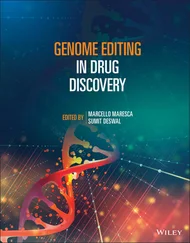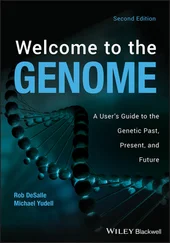Genome - Matt Ridley
Здесь есть возможность читать онлайн «Genome - Matt Ridley» — ознакомительный отрывок электронной книги совершенно бесплатно, а после прочтения отрывка купить полную версию. В некоторых случаях можно слушать аудио, скачать через торрент в формате fb2 и присутствует краткое содержание. Жанр: Старинная литература, на английском языке. Описание произведения, (предисловие) а так же отзывы посетителей доступны на портале библиотеки ЛибКат.
- Название:Matt Ridley
- Автор:
- Жанр:
- Год:неизвестен
- ISBN:нет данных
- Рейтинг книги:5 / 5. Голосов: 1
-
Избранное:Добавить в избранное
- Отзывы:
-
Ваша оценка:
- 100
- 1
- 2
- 3
- 4
- 5
Matt Ridley: краткое содержание, описание и аннотация
Предлагаем к чтению аннотацию, описание, краткое содержание или предисловие (зависит от того, что написал сам автор книги «Matt Ridley»). Если вы не нашли необходимую информацию о книге — напишите в комментариях, мы постараемся отыскать её.
Matt Ridley — читать онлайн ознакомительный отрывок
Ниже представлен текст книги, разбитый по страницам. Система сохранения места последней прочитанной страницы, позволяет с удобством читать онлайн бесплатно книгу «Matt Ridley», без необходимости каждый раз заново искать на чём Вы остановились. Поставьте закладку, и сможете в любой момент перейти на страницу, на которой закончили чтение.
Интервал:
Закладка:
The other genetic condition has the opposite effect: it lowers linguistic ability without apparently affecting intelligence, or at least not consistently. Known as specific language impairment (SLI), this condition is at the centre of a fierce scientific fight. It is a battleground between the new science of evolutionary psychology and the old social sciences, between genetic explanations of behaviour and environmental ones. And the gene is here on chromosome 7.
That the gene exists is not at issue. Careful analysis of twin studies unambiguously points to a strong heritability for specific language impairment. The condition is not associated with neurological damage during birth, is not associated with linguistically impoverished upbringings, and is not caused by general mental retardation. According to some tests — and depending on how it is defined — the heritability approaches one hundred per cent. That is, identical twins are roughly twice as likely to share the condition as fraternal twins.
That the gene in question is on chromosome 7 is also not in much 9 8 G E N O M E
doubt. In 1997 a team of Oxford-based scientists pinned down a genetic marker on the long arm of chromosome 7, one form of which co-occurs with the condition of S L I . The evidence, though based only on one large English family, was strong and unambiguous.6
So why the battleground? The argument rages about what SLI is. To some it is merely a general problem with the brain that affects many aspects of language-producing ability, including principally the ability to articulate words in the mouth and to hear sounds correctly in the ear. The difficulty the subjects experience with language follow from these sensory problems, according to this theory. To others, this is highly misleading. The sensory and voice problems exist, to be sure, in many victims of the condition, but so does something altogether more intriguing: a genuine problem understanding and using grammar that is quite independent of any sensory deficits. The only thing both sides can agree upon is that it is thoroughly disgrace-ful, simplistic and sensationalist of the media to portray this gene, as they have done, as a 'grammar gene'.
The story centres on a large English family known as the Ks.
There are three generations. A woman with the condition married an unaffected man and had four daughters and one son: all save one daughter were affected and they in turn had between them twenty-four children, ten of whom have the condition. This family has got to know the psychologists well; rival teams besiege them with a battery of tests. It is their blood that led the Oxford team to the gene on chromosome 7. The Oxford team, working with the Institute of Child Health in London, belongs to the 'broad' school of S L I , which argues that the grammar-deficient skills of the K
family members stem from their problems with speech and hearing.
Their principal opponent and the leading advocate of the 'grammar theory' is a Canadian linguist named Myrna Gopnik.
In 1990 Gopnik first suggested that the K family and others like them have a problem knowing the basic rules of English grammar.
It is not that they cannot know the rules, but that they must learn them consciously and by heart, rather than instinctively internalise them. For example, if Gopnik shows somebody a cartoon of an I N S T I N C T 9 9
imaginary creature and with it the words 'This is a Wug', then shows them a picture of two such creatures together with the words 'These are . . .', most people reply, quick as a flash, 'Wugs'. Those with SLI rarely do so, and if they do, it is after careful thought. The English plural rule, that you add an 's' to the end of most words, is one they seem not to know. This does not prevent those with SLI knowing the plural of most words, but they are stumped by novel words that they have not seen before, and they make the mistake of adding 's' to fictitious words that the rest of us would not, such as 'saess'. Gopnik hypothesises that they store English plurals in their minds as separate lexical entries, in the same way that we all store singulars. They do not store the grammatical rule.7
The problem is not, of course, confined to plurals. The past tense, the passive voice, various word-order rules, suffixes, word-combination rules and all the laws of English we each so unconsciously know, give SLI people difficulty, too. When Gopnik first published these findings, after studying the English family, she was immediately and fiercely attacked. It was far more reasonable, said one critic, to conclude that the source of the variable performance problems lay in the language-processing system, rather than the underlying grammar. Grammatical forms like plural and past tense were particularly vulnerable, in English, in individuals with speech defects. It was misleading of Gopnik, said another pair of critics, to neglect to report that the K family has a severe congenital speech disorder, which impairs their words, phonemes, vocabulary and semantic ability as well as their syntax. They had difficulty understanding many other forms of syntactical structure such as reversible passives, post-modified subjects, relative clauses and embedded forms.
These criticisms had a whiff of territoriality about them. The family was not Gopnik's discovery: how dare she assert novel things about them? Moreover, there was some support for her idea in at least part of the criticism: that the disorder applied to all syntactical forms. And to argue that the grammatical difficulty must be caused by the mis-speaking problem, because mis-speaking goes with the grammatical difficulty, was circular.
IOO G E N O M E
Gopnik was not one to give up. She broadened the study to Greek and Japanese people as well, using them for various ingenious experiments designed to show the same phenomena. For example, in Greek, the word 'likos' means wolf. The word 'likanthropos'
means wolfman. The word 'lik', the root of wolf, never appears on its own. Yet most Greek speakers automatically know that they must drop the '-os' to find the root if they wish to combine it with another word that begins with a vowel, like '-anthropos', or drop only the
's', to make 'liko-' if they wish to combine it with a word that begins with a consonant. It sounds a complicated rule, but even to English speakers it is immediately familiar: as Gopnik points out, we use it all the time in new English words like 'technophobia'.
Greek people with SLI cannot manage the rule. They can learn a word like 'likophobia' or 'likanthropos', but they are very bad at recognising that such words have complex structures, built up from different roots and suffixes. As a result, to compensate, they effectively need a larger vocabulary than other people. 'You have to think of them', says Gopnik, 'as people without a native language.' They learn their own tongue in the same laborious way that we, as adults, learn a foreign language, consciously imbibing the rules and words.9
Gopnik acknowledges that some SLI people have low IQ on non-verbal tests, but on the other hand some have above-average I Q . In one pair of fraternal twins, the SLI one had higher non-verbal IQ than the unaffected twin. Gopnik also acknowledges that most SLI people have problems speaking and hearing as well, but she contends that by no means all do and that the coincidence is irrelevant. For instance, people with SLI have no trouble learning the difference between 'ball' and 'bell', yet they frequently say 'fall'
when they mean 'fell' - a grammatical, not a vocabulary difference.
Likewise, they have no difficulty discerning the difference between rhyming words, like 'nose' and 'rose'. Gopnik was furious when one of her opponents described the K family members' speech as
'unintelligible' to outsiders. Having spent many hours with them, talking, eating pizza and attending family celebrations, she says they are perfectly comprehensible. To prove the irrelevance of speaking I N S T I N C T 1 0 1
Читать дальшеИнтервал:
Закладка:
Похожие книги на «Matt Ridley»
Представляем Вашему вниманию похожие книги на «Matt Ridley» списком для выбора. Мы отобрали схожую по названию и смыслу литературу в надежде предоставить читателям больше вариантов отыскать новые, интересные, ещё непрочитанные произведения.
Обсуждение, отзывы о книге «Matt Ridley» и просто собственные мнения читателей. Оставьте ваши комментарии, напишите, что Вы думаете о произведении, его смысле или главных героях. Укажите что конкретно понравилось, а что нет, и почему Вы так считаете.












